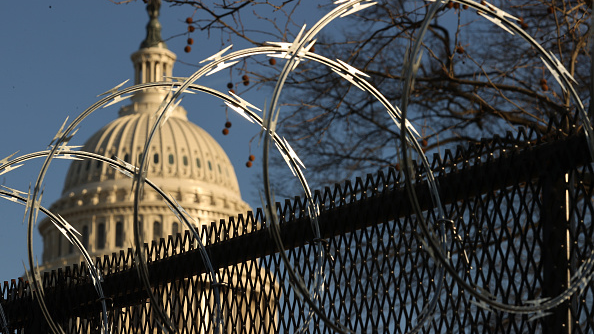
Concertina razor wire tops the 8-foot "non-scalable" fence that surrounds the U.S. Capitol in Washington, DC., U.S., January 14, 2021. /Getty
Concertina razor wire tops the 8-foot "non-scalable" fence that surrounds the U.S. Capitol in Washington, DC., U.S., January 14, 2021. /Getty
Editor's note: Bradley Blankenship is a Prague-based American journalist, political analyst and freelance reporter. The article reflects the author's opinions and not necessarily the views of CGTN.
Weeks ago, U.S. President Joe Biden assured global leaders at the UN General Assembly that his administration was not trying to start a new Cold War and that his country is shifting gears to "relentless diplomacy" instead of "relentless war."
However, his administration's actions to this point suggest the complete opposite – increasing tensions over China's Taiwan region are making the potential for an actual hot war, never mind a cold one, more likely.
This is extraordinarily irresponsible for the U.S. but not all that surprising. It's obvious that the U.S. is so fundamentally degraded in its power relative to other rising powers that its clandestine abilities – its ability to gather information and even its ability to accurately assess situations – have eroded away.
While the U.S. military does have a huge budget – by far the largest in the world – this doesn't automatically mean it is the strongest in the world. Current and former officials are even starting to make this clear.
For example, U.S. Secretary of the Navy Carlos Del Toro in October issued the Biden administration's first naval strategic guidance, which publicly admitted that China is "a strategic competitor who possesses naval capabilities that rival our own."
In addition, Nicolas Chaillan, the Pentagon's first chief software officer who just recently resigned in protest over the U.S. military's slow pace of technological innovation and because he couldn't stand to watch China overtake the U.S., said the U.S. has already lost its fight in the artificial intelligence domain with China. This obviously has strong implications for cybersecurity, intelligence and an array of other fields.
"We have no competing fighting chance against China in 15 to 20 years. Right now, it's already a done deal; it is already over in my opinion," Chaillan, who will soon testify to Congress on this matter, told the Financial Times.

A panda robot named "Youyou" is unveiled at the World Robot Conference 2021 in Beijing, China, September 10, 2021. /Getty
A panda robot named "Youyou" is unveiled at the World Robot Conference 2021 in Beijing, China, September 10, 2021. /Getty
If indeed the case that "the deal is done" on AI and that China and the U.S. admittedly have equal naval capabilities, what strategic sense is there in the Biden administration trying to spark tensions over Taiwan?
The Biden administration is clearly trying to consolidate support for separatist forces in Taiwan, and apparently, some members of Congress want to expand the administration's ability to defend against an "invasion" of the island.
However, for some politicians, it's not about so-called Taiwan independence or the lives of Taiwan residents but about trying to frame China's legal right to self-defense as an act of aggression to isolate China globally.
They perceive China's standing up for itself as an act of hostility, but whoever believes this would actually be the case in the administration is just plain wrong.
It's true that the U.S. has soft power and cultural influence through its propaganda machines in the media. But China's territorial integrity has continually survived an onslaught of this American propaganda, and there's no reason to think that it would be different this time.
In fact, propaganda efforts to undermine China's territorial integrity have become so juvenile and easily debunked that they pretty much stopped trying to push them. The narrative of genocide taking place in China's Xinjiang Uygur Autonomous Region is one example.
Instead of holding onto this perverse ideology of American exceptionalism, the U.S. has to find a way to cope with China's existence as an equal. There is simply no other way for this situation to work.
It's clear that this is the case since even non-military confrontation in areas like technology and trade is already counterproductive and serves zero logical purpose. Washington continually stands alone on these issues because of it.
Policymakers in Washington are simply detached from reality, stuck in the delusion of American exceptionalism while things at home – civil society, infrastructure and the so-called American Dream – are crumbling.
People around the world are only going to become more distrustful of this terminally ill empire known as the United States of America, so a last-ditch war with China would not get the world to join in on this delusion, which certainly wouldn't benefit Americans.
(If you want to contribute and have specific expertise, please contact us at opinions@cgtn.com.)

